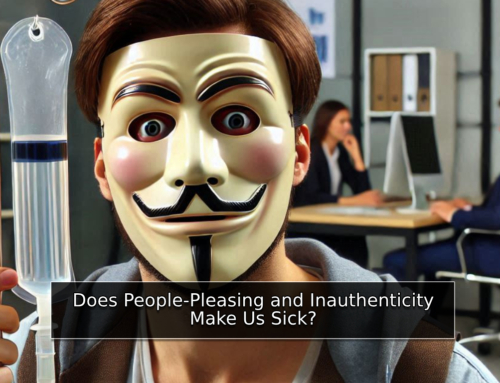The Attachment to Self-Identity
Are You Living Your Life?
Have you ever felt like you're living someone else's life? As if you're playing a role in a script that someone else wrote? The attachment to a self-identity that isn't truly our own can be a limiting factor in our lives. This post explores the concept of self-identity and asks the question: Are you truly living your life?
Our self-identity is a narrative we construct about ourselves over time. It's influenced by our experiences, beliefs, and the expectations of others. Trauma, in particular, can significantly impact the development of our self-identity. Traumatic experiences can lead to the development of coping mechanisms that, while helpful in the short term, can become limiting in the long run. For example, individuals who have experienced trauma may develop a self-identity that is characterized by fear, mistrust, and a sense of isolation. This can make it difficult to form healthy relationships, pursue personal goals, and experience joy and fulfillment.
The Illusion of the Self
We often believe that our self-identity is fixed and unchanging. However, this is an illusion. Our sense of self is constantly evolving, shaped by new experiences and relationships. When we become too attached to a particular self-image, we can become resistant to change and growth.
The Consequences of a Limited Self-Identity
Living inauthentically can have a profound impact on our well-being. Some of the common consequences of a limited self-identity include:
- Lack of fulfillment: When we aren't living in alignment with our true selves, we may feel a sense of emptiness or dissatisfaction.
- Fear of failure: We may be afraid to take risks or pursue our dreams for fear of damaging our carefully constructed self-image.
- Difficulty connecting with others: When we present a false version of ourselves to the world, it can be difficult to form deep and meaningful connections.
- Burnout: Constantly trying to live up to an unrealistic ideal can lead to exhaustion and burnout.
Breaking Free from the Chains of Self-Identity
So, how can we break free from the limitations of our self-identity and start living more authentically?
- Practice mindfulness: Pay attention to your thoughts and feelings without judgment.
- Challenge your beliefs: Question the assumptions you have about yourself and the world.
- Step outside of your comfort zone: Embrace new experiences and opportunities for growth.
- Connect with others: Build deep and meaningful relationships with people who support and challenge you.
- Seek professional help: If you're struggling to make significant changes on your own, consider talking to a therapist.
The Role of Therapy
Therapeutic approaches like Cognitive Behavioral Therapy (CBT) and Acceptance and Commitment Therapy (ACT) can be invaluable in helping individuals break free from the limitations of their self-identity.
- CBT can help individuals identify and challenge negative thought patterns and develop more realistic and positive self-beliefs.
- ACT can help individuals accept their thoughts and feelings without judgment and cultivate greater mindfulness and self-compassion.
By working with a therapist, individuals can learn to:
- Identify and challenge limiting beliefs: Recognize and dismantle self-defeating thoughts and beliefs that are holding them back.
- Develop self-compassion: Treat themselves with kindness and understanding, recognizing that everyone makes mistakes.
- Cultivate mindfulness: Become more aware of their thoughts, feelings, and sensations in the present moment.
- Develop a more flexible and adaptable sense of self: Learn to embrace change and uncertainty.
In Conclusion
By breaking free from the chains of self-identity, we can unlock our full potential and live a more fulfilling life. Remember, your identity is not fixed; it's a journey, not a destination.
Note: This information is for informational purposes only and is not a substitute for professional medical or psychological advice. The information presented here is based on scientific research and clinical experience but does not constitute a recommendation for specific treatment. Each individual is unique, and the most appropriate treatment will be determined by a healthcare professional.
Contact now
Ready to take the first step towards positive change? Contact me now for more information and to schedule an appointment. Whether you prefer in-person sessions in Tel Aviv or virtual meetings via Zoom, my integrated approach of Cognitive Behavioral Therapy (CBT) and Acceptance and Commitment Therapy (ACT) can help you break free from struggles and find greater fulfillment in life. I'll be sure to get back to you as soon as possible. Let's embark on this transformative journey together!
Call Whatsapp 052-2325511
Or fill out the following form.
Can ACT and CBT assist you or your loved ones?
Welcome to my therapy practice, where I offer a powerful combination of Cognitive Behavioral Therapy (CBT) and Acceptance and Commitment Therapy (ACT) techniques. CBT is a goal-oriented, short-term approach that's highly effective for anxiety, depression, low self-confidence, and more. ACT complements CBT, helping you navigate life's challenges and find fulfillment and authentic, happier life.
If you're struggling with anxiety, depression, low self-image, or facing setbacks, CBT combined with ACT may be the key to transforming your life. Break free from the struggle and take a step towards a happier, more fulfilling life.
Contact me today to schedule an appointment and embark on your journey of positive change. You don't have to face it alone; I'm here to support you every step of the way. Let's work together to create the life you deserve!





